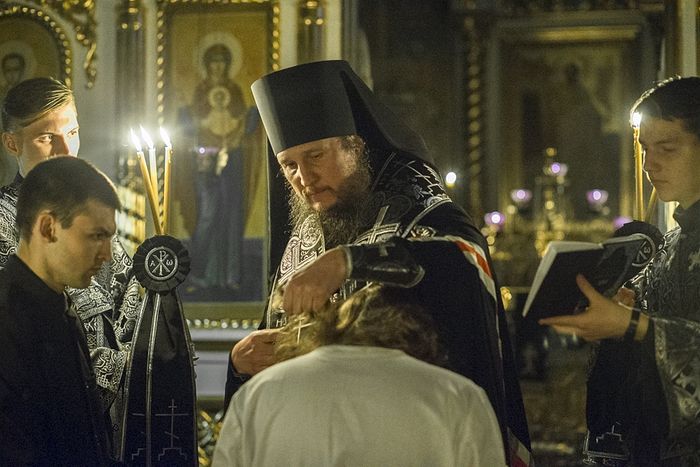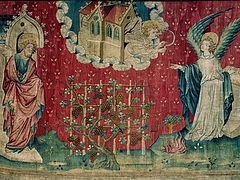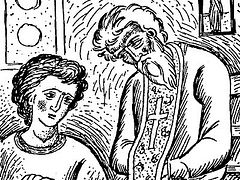The Apostles transferred the teaching of the Lord Jesus Christ to the world, along with the duty of absolute obedience to this teaching. Out of this righteous obedience to the commandments, passed from generation to generation, the Tradition was formulated which is called the Apostolic Tradition, encompassing the entirety of the Church’s faith. That is why the Apostle Paul praised the Corinthians’ obedience saying: Now I praise you, brethren, that ye remember me in all things, and keep the ordinances, as I delivered them to you. For Tradition in the Orthodox mind is the criterion for understanding the faith.
The opposite of Tradition is heresy, just as transgression is the opposite of obedience. Any departure from Tradition is heresy. Nobody can understand the faith except in the way it was delivered to the Church by the Apostles. About the Church’s overseers, St. Clement of Alexandria says, “They preserve the blessed Tradition of the faith that is handed down directly from the holy Apostles.” And Eusebius of Ceasarea says that St. Ignatius of Antioch was a defender of the faithful against heresies and that “he firmly exhorted them in the Apostolic Tradition.”
Thus, the blessed Tradition emerged from obedience. Obedience in Orthodoxy is an inseparable part of the life of the faithful who endure in the journey of their salvation, for in the Fall our human nature lost the ability to discern between the righteous and the wicked, between good and evil. It was in need of blessed obedience in order to face the effects of its corrupted fallen state. This is the reason why disobedience became the sign of abominable pride and error, while obedience is the sign of blessed humility and self-denial. Pride and self-love, which are the source of all passions and falls, oppose obedience.
The concept of obedience grew through the traditional monastic communities, where obedience constitutes the foundation of every monk’s journey. Pure prayer and every spiritual growth is produced through obedience. The obedient monk has his internal senses cleansed, his mind enlightened, and his will purified. He is able, in this present life, to behold something from God’s eternal revelations. But the disobedient monk opens the door to satan to enter and leave as he wills, condemning himself with a confused mind where thoughts are restless and passions are agitated. For a man to do his own will and cling to his thoughts constitutes the origin of every fall and further adherence to Adam’s disobedience. Christ came first to heal our self-will, to teach us obedience by surrendering our own will to his Divine will, the same way He Himself willingly subjected His human will to His Divine will. Christ freed us from the iniquity of our fallen proud will. He freed us through His Cross and Resurrection, but also through His obedience and living example.
This is why the monk promises upon his tonsure to keep his three monastic vows, among which obedience is the most important.
Upon this concept is also built the obedience of the lay faithful to their spiritual fathers who keep the Holy Tradition and act according to it. The most important characteristic of a father in the Church is his absolute obedience to Orthodox Tradition. This is why the Church takes an oath and confession from a bishop during his enthronement to accept what the Church accepts and anathematize what it anathematizes. Thus, does he have the right thereafter to accept what the Church has anathematized? Only this obedience preserves the grace of the Holy Spirit in the Church, because it cuts the root of every heresy and teaching that opposes Tradition, causing separation from grace and spiritual death.
Obedience in Orthodoxy is not to persons, otherwise it becomes worldly biases. The one who is biased does not care about the Tradition of the faith nor dogma, but only person toward whom he is biased, regardless of whether this person is Orthodox or heterodox. St. Paul warned the Corinthians against such biases. Therefore obedience, through the bishop and spiritual father, is to the Church and to the holy Orthodox faith upon which the Church is founded. This is what our Holy Fathers called the obedience to Holy Tradition that should be fully represented in the person of the bishop. For he transmits the Tradition of everything that the Spirit has continually taught the Church from the beginning. As such, Tradition becomes the journey or history of salvation, not a collection of dogmas and practices from the past.
The true bishop is born out of obedience, by subjecting his own will to God and the Church. The bishop submits to Christ by keeping His commandments, and to the Church by keeping its canons. Christ and the Church are not separate truths, but one truth. The bishop who is unfaithful to Church canons is disloyal to all the faith, and becomes an adversary to God and the Church.
The world has its ways of convincing the many faithful who were entrusted to salvation with many arguments, that they supposedly do not oppose the faith but do God’s will while they in fact do their own will and violently resist whoever disagrees with their opinions. St. Dorotheos of Gaza says that if a man does not honestly seek God’s will, then even if he asks a prophet, God will place in the prophet’s heart an answer that fits the deception in the seeker’s heart. As the Bible says: And if the prophet be deceived when he hath spoken a thing, I the Lord have deceived that prophet (Ezek. 14:9).
No one is deceived but those who disdain obedience to the Orthodox spirit that the Church has followed from the days of the Apostles until today, and who impose their own thoughts that are harmful to the faith. They are many in the Church nowadays. They willingly submit to the spirit of this age that is full of evil, debauchery, and heretical teachings. They transgress and overlook under the pretext that we live in an age that requires such changes and omissions. They justify themselves with these excuses and subject the Church to secularism and conformity to the spirit of this world. St. Hilary of Poitiers says, “The Church boasts that the world loves her; the world's hatred was the evidence that she was Christ's.”
As the disobedient monk cannot feel peace within himself, so those who were entrusted to the Church of Christ, the bishop and priests, will not find true rest except through blessed obedience to the faith, dogmas, and canons that define the foundation of this faith. Our Holy Fathers were persecuted for the faith, and in the depth of their sufferings of exile and martyrdom, their internal peace was increasingly pure and still, for only one reason—because Divine grace was strongly witnessing within them to the glory of the truth they were defending. But their enemies were full of feelings of confusion, anger and the desire for revenge. St. Hilary of Poitiers expresses the state of peace that he experienced when the heretics exiled him saying: “For me, I do not complain of the times: I rejoice rather, that iniquity has revealed itself in this my exile, when, unable to endure the truth, it banishes the preachers of sound doctrine, that it may heap up for itself teachers after its own desires. I glory in my exile, and rejoice in the Lord.”
As a bishop, St. Hilary understood that keeping the holy Orthodox faith is not fulfilled except by rejecting any teaching that opposes this faith. He defended this faith as a bishop, considering it to be the same faith of the Apostles. He said as another Paul: “I have spoken what I myself believed, conscious that I owed it as my soldier’s service to the Church to send to you in accordance with the teaching of the Gospel by these letters the voice of the office which I hold in Christ, and this voice is nothing but the echo to the voice of the Church and the teaching of the Apostles.”





